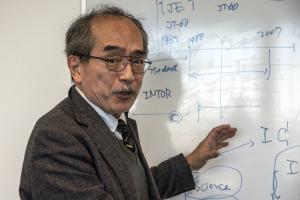Yutaka Kamada, Science et Technologie
Adolescent, Yutaka Kamada s'est découvert deux passions : les cactus et l'énergie de fusion. Un demi-siècle plus tard, il possède une collection de 500 cactus et occupe le poste de directeur général adjoint (Science et Technologie) du plus gros programme de recherche sur la fusion de tous les temps. Mais quels sont les points communs entre la culture des cactus et la gestion d'un programme de fusion ? Ces deux activités exigent de la patience, une parfaite compréhension des processus à l'œuvre ainsi que des procédures rigoureuses.
La fusion est entrée dans la vie de Yutaka Kamada par le biais d'un livre, lu à l'âge de 14 ans. « Il s'agissait de l'ouvrage Challenge to Plasma Fusion de Shoichi Yoshikawa, un scientifique de renom spécialiste des plasmas. C'est mon père, chimiste de formation, qui m'avait conseillé de le lire et j'ai été immédiatement fasciné, » explique-t-il. « Récemment, un vieil ami de l'époque m'a félicité pour ma nomination de directeur général adjoint d'ITER, me rappelant que, il y a 50 ans, j'étais fermement déterminé à « relever le défi de la fusion » ! ».
Yutaka Kamada a suivi des études d'ingénierie nucléaire, abordant notamment la physique nucléaire et des plasmas, la voie royale pour réaliser son rêve d'adolescent. Il a obtenu son doctorat à l'université de Tokyo en 1988, rejoignant la même année les équipes de chercheurs du tokamak JT-60. Directeur de recherche en 1996 puis responsable japonais du programme de fusion JT-60SA mis en oeuvre par l'Europe et le Japon (2008-2020) il est nommé directeur général adjoint de l'institut de la fusion de Naka en 2018.
Yutaka Kamada a commencé à contribuer directement à ITER en 1999, lorsqu'il a rejoint l'International Tokamak Physics Activity (ITPA) dont il a présidé le comité de coordination de 2010 à 2013. Sa participation au comité consultatif Science et Technologie (STAC) du Conseil ITER, qu'il a présidé en 2016 et en 2017, tout comme ses fonctions de représentant du Japon au Conseil ITER, de 2019 à 2022 lui ont permis de se familiariser avec les rouages internes et le processus décisionnel du programme,
L'expérience acquise à la tête du JT-60SA (le directeur général d'ITER Pietro Barabaschi a dirigé la contribution européenne au programme de 2007 à 2021), ainsi qu'au sein de l'institut de la fusion de Naka et des structures centrales d'ITER, lui sera précieuse dans ses nouvelles fonctions. « Notre priorité actuelle est de définir un objectif et un calendrier clairs, et l'intégration est essentielle pour y parvenir », dit-il. « Il s'agit d'une intégration technique, mais également humaine. Nous devons mieux intégrer les personnels, les équipes et tous ceux qui contribuent au programme mondial ITER. Si nous parvenons à tous partager le même objectif et à améliorer le partage de l'information au sein d'ITER Organization ainsi qu'entre ITER Organization et les agences domestiques, alors, je suis résolument optimiste. »
Chacune des sept agences domestiques d'ITER est le reflet de la culture, des préoccupations et des stratégies du Membre dont elles émanent, c'est pourquoi les interactions entre les différentes agences et avec ITER Organization ne sont pas toujours simples. Comme l'actuel directeur général, Yutaka Kamada pense qu'une meilleure intégration, une meilleure communication et un partenariat encore plus étroit seront déterminants dans le succès d'ITER. « Les agences domestiques sont chargées de fournir les composants et les systèmes d'ITER. Mais leur contribution ne doit pas s'arrêter pas là. Elles doivent participer aux phases d'assemblage et d'exploitation parce qu'il s'agit du prolongement des fabrications qu'elles ont réalisés. Mais aussi parce qu'elles sont attachées à ces composants et veulent les voir fonctionner. »
Le rôle plus large que la nouvelle direction souhaite confier aux agences domestiques s'inscrit dans un mouvement plus vaste, que la réorganisation à venir et la définition d'une nouvelle feuille de route facilitera.
L'adolescent qui voulait « relever le défi de la fusion » il y a 50 ans est encore très vivant chez Yutaka. Mais il n'aurait jamais pensé, à l'époque, que ce défi porterait tout autant sur l'organisation et l'intégration que sur la physique et l'ingénierie.
Découvrez le communiqué de presse publié après sa nomination en anglais et en français.


